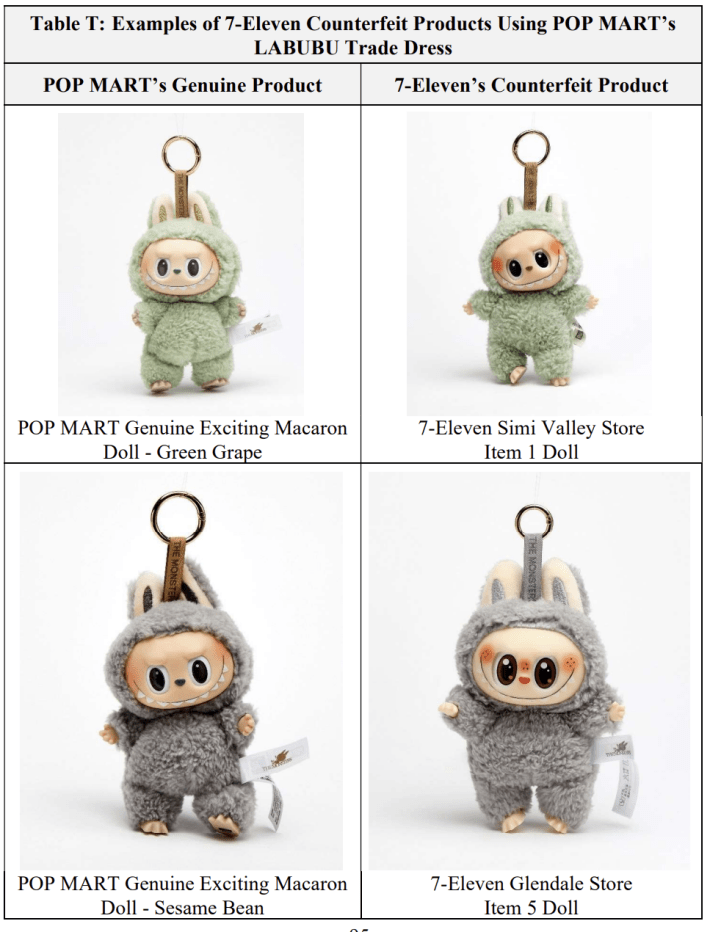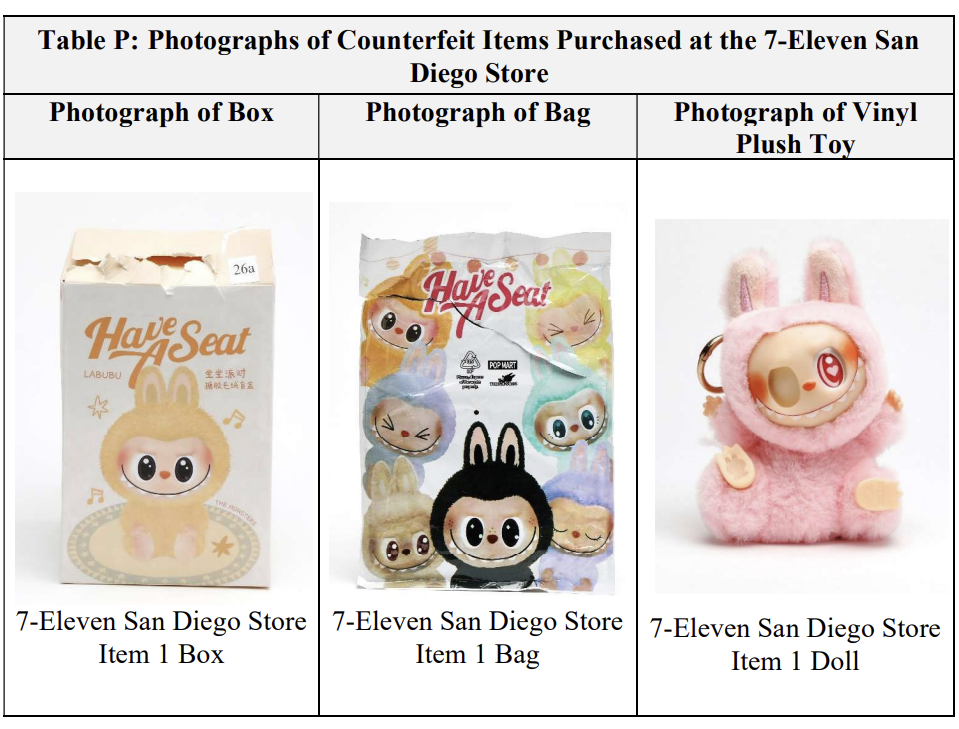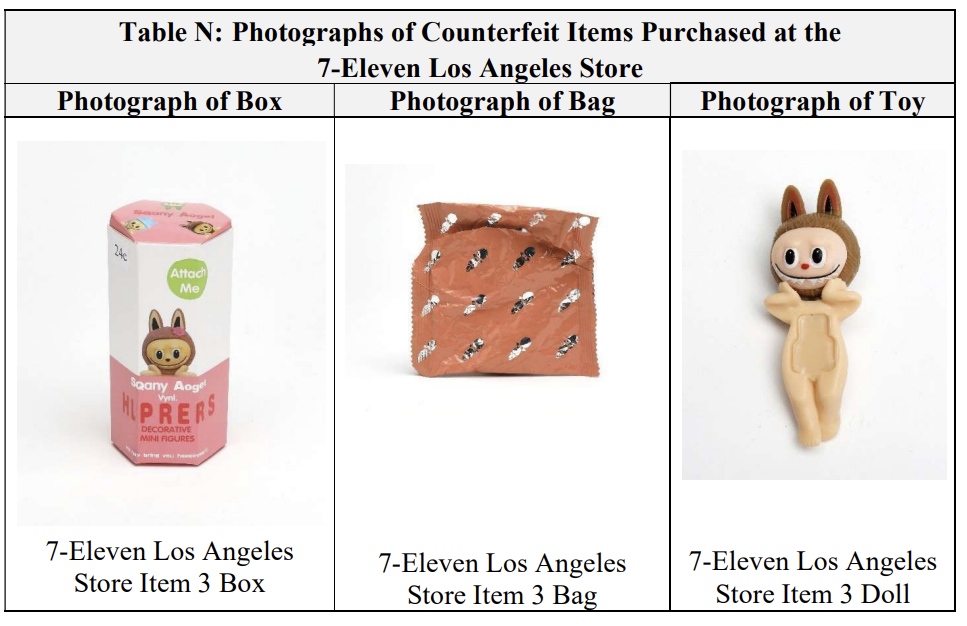Labubus are everywhere — dangling from Lady Gaga’s Hermes bag, selling for more than $10,000 on eBay, protesting ICE raids, and sold at 7-Eleven. But Chinese toy company Pop Mart is suing 7-Eleven, saying in a complaint filed in July in California that the blind boxes sold at 7-Eleven stores are counterfeit.
Pop Mart’s fuzzy, grinning plush toys are inspired by a series called The Monsters, designed by Hong Kong artist Kasing Lung. Pop Mart started selling plush Labubu keychains in 2023, but they became a sensation in 2025. Pop Mart made $1.8 billion in 2024 thanks to a 1,200% increase in plush toy sales from 2023 to 2024, it says in the complaint. Labubu sales alone added up to $418 million, Pop Mart founder Wang Ning said in a recent interview. Pop Mart says in its lawsuit that the “surge in sales” is “a trend that is only increasing in 2025 so far.”

Labubus are largely sold in themed blind boxes that include one of roughly a half-dozen or so options. For instance, an individual Have A Seat series blind box will include one of seven figures, and you won’t know what you’re getting until you open the sealed bag inside the box. One Labubu, with butter yellow fur, has its eyes squeezed shut. Another, with soft purple fuzz, also has its eyes shut — gently closed. The mint green Labubu’s wild eyes are open, colored a piercing teal.
The popularity of Labubus — and the built-in scarcity of low stock and the blind box system — means it can be relatively hard to get a Labubu. Or, at least, a Labubu that’s definitely real. There’s a growing market for counterfeit Labubus, colloquially called Lafufus, that have similar packaging but often have a low quality fake plush inside. Some people don’t really care; Lafufus have their own fanbase that loves them for their even more deranged look. (And for the price; the standard Labubu size typically costs around $20. Lafufus can be purchased for less than $10.) Business Insider reported in May that Lafufus are having their own cultural moment — the jank is kind of funny.
Lafufus are everywhere on the internet; you’re probably not going to get a real Labubu from, say, TikTok Shop or Temu. But they’re also popping up in 7-Elevens around the country.
Pop Mart shows in the lawsuit several instances of what it says are 7-Eleven stores selling fake Labubus. The packaging the company has collected looks real enough, but inside, the Lafufus are real busted. The proportions are all wrong, and their heads fit improperly into their fur suits, giving them bulbous foreheads. Faces are misprinted, leaving the iconic mischievous grin slightly askew. Some are missing eyes. In one especially disturbing instance, some Lafufu maker has seemingly transposed a Labubu head on a naked Sonny Angel body.

“Pop Mart does not offer its products in 7-Eleven stores, which are well known for offering snacks and everyday necessities, but not innovative, carefully managed, artist-designed toy experiences,” Pop Mart says in the complaint.
The big problem here for Pop Mart is that some people are likely seeing these products and buying them thinking they’re real Labubus — something the company says 7-Eleven is doing “knowingly, willfully, intentionally, and maliciously.” Pop Mart is suing on 17 different counts, including several different trademark, copyright, and trade dress violations, and is asking the court to force 7-Eleven to stop selling Lafufus and award Pop Mart damages for the infringement.

The fake Labubu crackdown doesn’t stop there, though: Chinese authorities have seized tens of thousands of fake plushies. Pop Mart is also reportedly trying to trademark the word Lafufu, the Washington Post reported, citing Chinese state media, in an effort to stop the fakes. U.K. police have seized “hundreds of thousands” of fake Labubus from its ports, according to BBC. The Better Business Bureau is also warning U.S. buyers about the influx of Lafufus; more than 70 complaints have been lodged with the organization against companies or stores selling fakes. On Pop Mart’s end, the company has a page on its website for people to verify and authenticate their Labubus, scanning both a QR code on the Labubu blind box and a QR code on the Labubu wash label.
The danger of it all, for Pop Mart, is that counterfeits are flooding the market and undermining its exorbitant profits. The BBC says Lafufus are dangerous for kids because they’re so poorly made: The eyes and feet pop off so easily that they can become choking hazards. And so, the market for Lafufus is “going underground,” according to The Guardian, where elderly women slice open molded plastic monster heads to prepare them for stuffing.


